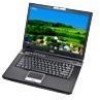Fujitsu A6220 A6220 User's Guide - Page 87
IEEE 1394 Port, In order to connect a 1394 device
 |
View all Fujitsu A6220 manuals
Add to My Manuals
Save this manual to your list of manuals |
Page 87 highlights
PRESSING THE [FN] + [F10] KEYS ALLOWS YOU TO CHANGE YOUR SELECTION OF WHERE TO SEND YOUR DISPLAY VIDEO. EACH TIME YOU PRESS THE KEY COMBINATION, YOU WILL STEP TO THE NEXT CHOICE, STARTING WITH THE BUILT-IN DISPLAY PANEL ONLY, MOVING TO THE EXTERNAL MONITOR ONLY, FINALLY MOVING TO BOTH THE BUILT-IN DISPLAY PANEL AND AN EXTERNAL MONITOR. IEEE 1394 Port The 4-pin 1394 port allows you to connect digital devices that are compliant with IEEE 1394 standard. The IEEE 1394 standard is easy to use, connect, and disconnect. This port can allow up to 400 Mbps transfer rate. A third-party application is required to operate your digital device with the 1394 port. THE 1394 PORT USED IN THIS SYSTEM USES A FOUR-PIN CONFIGURATION. IF YOU INTEND TO INTERFACE WITH DEVICES WHICH USE A SIX-PIN CONFIGURATION, YOU WILL NEED TO PURCHASE AN ADAPTER. In order to connect a 1394 device, follow these steps: 1 Align the connector with the port opening. 2 Push the connector into the port until it is seated. Figure 42. Connecting an IEEE 1394 Device 87 - Device Ports















